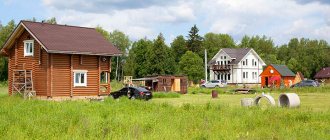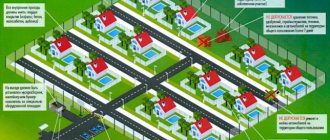Working on your own site is considered one of the common forms of leisure for many people. Together with their loved ones, summer residents and gardeners make up almost half of the country's population. There are especially many of them in large cities of the European part of Russia. On the modern map of gardening partnerships there are about 80 thousand citizen associations. They supply almost half of the berries, fruits and vegetables grown in the country. Let us consider further in detail what a gardening non-profit partnership is.
Normative base
Gardeners, gardeners and summer residents have a lot in common. However, they differ from each other in a number of ways. Federal Law-66 “On gardening partnerships, garden and dacha associations” defines these three categories. Plots are provided to citizens for various purposes. Vegetable and garden plots are used for growing vegetables, fruits and other agricultural crops. Dacha plots are provided for recreation, but with the opportunity to cultivate the land and harvest crops. At the same time, garden and vegetable plots differ in that the owners of the former can erect economic and residential buildings on them. Owners of summer cottages may or may not have such an opportunity. A gardener does not have the right to register in a residential building erected on his land. This opportunity is provided to dacha owners.
Pros and cons of SNT, ONT, DNT and SNK, ONK, DNK, as well as SNP, ONP, SNP
Notes
Classification by organizational and legal form The legislation of the Russian Federation provides for the following organizational and legal forms: horticultural, vegetable gardening and dacha non-profit associations: Non-profit partnership A horticultural, gardening or dacha non-profit partnership is an organization in which property created or acquired through contributions from members of the partnership is the property of the partnership as a legal entity, with the exception of property acquired or created at the expense of so-called funds.
Legal controversy
Until 1990, citizens could only build one-story summer houses on garden plots. At the same time, the size of the structures was strictly regulated. The maximum permissible size of buildings was established by the charter of the gardening partnership. In the early 90s, the situation in the country changed dramatically. However, the legislation remains the same. Ignoring the changes by the rule-makers caused a lot of controversy in society. A completely natural reaction to the discussion that arose was the Resolution of the Constitutional Court No. 7-P of April 14, 2008. In connection with numerous complaints from citizens, paragraph. 2 tbsp. 1 Federal Law “On gardening partnerships, garden and dacha societies” for compliance with the Constitution. Subsequently, several more acts were adopted on this issue. As a result, the ban on registering persons at their place of residence in a suburban building located on a garden plot located within the territory of populated areas was found to be inconsistent with the Basic Law. This conclusion is present in the resolution of the Constitutional Court No. 13-P of June 30, 2011.
PRO new building (Moscow)
- A credit cooperative, like others, is a non-profit organization.
- A cooperative can be created if there are at least 15 individuals/5 legal entities among those interested. persons
- If such a cooperative is created jointly by legal entities. and physical individuals require at least 7 in total.
- The highest governing body will be the meeting of shareholders.
- The CCP is similar in its activities to a mutual aid fund.
- The cooperative attracts money from shareholders, which is allocated by providing loans to its members. The profit received from borrowers is used to pay for the deposits of shareholders.
- The CPC cannot provide loans to persons who are its members. Also, non-participants cannot act as guarantors.
- A credit cooperative is required to comply with certain financial standards. Thus, the maximum amount of one loan that is provided to one member cannot be more than 10% of the total amount of debt on loans already issued at the time of the decision to approve the loan (and no more than 20% in the case of a CCP operating for less than two years).
We recommend reading: How to pay off a mortgage using maternity capital
A consumer cooperative is a non-profit organization, which is presented in the form of a voluntary association of citizens and legal entities. persons based on membership and aiming to satisfy material and other needs, which would be fulfilled through the pooling of contributions from the property shares of its members.
(2 ratings, average 4.5 out of 5)
Horticultural non-profit partnership
The regulations do not establish any prohibitions on running an individual farm. However, as practice has shown, uniting people is more beneficial both for themselves and for society. In this regard, citizens voluntarily establish associations whose task is to assist participants in solving general social and economic issues. One of the most common types of such associations is a gardening partnership (SNT). This can be a large or small association of citizens. The main condition is the presence of at least three members. The Law “On Gardening Partnerships” requires their mandatory registration. It is carried out in the manner established for legal entities.
Disadvantages of a dacha consumer cooperative
- It is quite difficult to create a WPC . The participation of at least 15 individuals and 5 legal entities is required.
- After the annual balance of the organization has been compiled, the resulting loss must be covered by all members of the cooperative within 3 months .
- Difficulty with registration . You can register on the territory of the KDP only if: you can prove that this is the owner’s only home; prove through an examination that it is suitable for habitation; obtain a positive court decision and register the dacha as a place of permanent residence.
- Since the KDP is often located far from the city, difficulties arise with infrastructure and landscaping .
- make all decisions , by voting at meetings and counting votes; very often, the simple human factor prevents the adoption of reasonable decisions. The same applies to the choice of governing body. Every member of the cooperative has the right to vote.
- All participants in a dacha consumer cooperative are equally responsible for any actions of the organization, which means they are equally exposed to material costs.
- Cooperative funds are formed from entrance and share fees . In the event of leaving the cooperative or the death of a shareholder, the entry fee is usually not returned; heirs can receive the shares, but they will be able to participate in the general meeting only after becoming members of the cooperative.
Constituent document: features
This is represented by the charter. It is approved at the general meeting of the association's participants. Over the past few decades, the country has undergone quite a lot of significant changes. Some of them made serious adjustments to the social and economic life of the population. The changes also affected various citizen associations, including gardening partnerships. The constituent documentation of such societies must correspond to the existing situation in the country. In practice, quite often the charters of partnerships are drawn up according to a standard model.
This does not always correspond to the realities of life. It follows from this that the main document of the SNT does not contribute to improving the management scheme of the association, nor does it help to rationally manage joint property. As a result, those who have joined a gardening partnership cannot fully exercise their civil rights and fulfill the responsibilities assigned to them. In this regard, the development of a constituent document must be approached not as a formality, but with a full understanding of its importance. It must specify the conditions, procedure in accordance with which a gardening partnership is created, the rules for participants joining and leaving the association, their duties, rights, and responsibilities. Moreover, all sections must take into account the specifics of the SNT being formed and comply with federal and regional regulations.
Advantages of creating a WPC
The main advantages of creating and participating in a dacha consumer cooperative include:
- Plots located in the Department of Development of Construction, as a rule, are priced much lower than plots intended for individual housing construction.
- If a number of requirements are met, it is possible to obtain registration on KDP land.
- Share contributions are not very burdensome, but with proper and rational management of the organization, the results are quite large-scale . For example, extending water and gas to remote areas is only possible through joint efforts. Also, cleaning and improvement of the area is under the constant control of the governing body of the association.
- Taxes on a plot are lower than with individual housing construction , since the company is formed primarily outside the city on an area of farmland.
- The interests of citizens who have joined a dacha consumer cooperative are represented by the chairman , that is, problems that arise on the site, if, for example, a pipe bursts or the electricity is turned off, are resolved jointly.
- The profit received by the enterprise is divided among its participants according to the efforts made , taking into account the personal contribution of each. Property is distributed in the same way in the event of liquidation of the community.
- Utility tariffs in DPK are lower than tariffs within the city.
- If the plot is planned to be used only for a summer residence, without the possibility of further registration, a building permit is not required.
Control
The powers of the chairman of the SNT are determined by 66 Law of Gardening Partnerships. They are also recorded in the constituent document of the association. The general meeting of members acts as the supreme governing body. Responsible persons (board) are determined by secret ballot. At the request of a certain part of the association, the question of their early re-election may be raised. Minutes are kept at each meeting. It is signed by the secretary and the chairman. These protocols are certified by a seal and are stored permanently.
A few words about activities
The legal basis for the activities of the DPK is the charter. It determines the amount of the authorized capital, the size and method of payment of contributions, the procedure for accepting new participants, the responsibility of participants, issues of distribution of profits, etc. After registration, the association will need a bank account and a seal.
DPK differs from horticultural and gardening cooperatives, first of all, in that the priority direction of its activity is the construction of houses and structures, as well as the improvement of dacha areas. While the association of gardeners and gardeners is being created with the aim of developing horticulture and gardening.
Participants' rights
An adult citizen who owns a plot within the land of the association can join a gardening partnership. Members of the society can elect and be elected to the board. They are also given the right to independently manage their own land according to the type of permitted use. If the allotment is not withdrawn from circulation, has no encumbrances or restrictions, the owner can freely dispose of it at his own discretion. He has the right to build, reconstruct, and rebuild structures on the site.
Benefits
If the buyer considers a dacha as an object where he can easily and without worries spend a few summer days, then a dacha cooperative may be a good solution. However, if serious construction is planned on this site, or there will be a need for permanent residence (all year round), or for full-scale construction of residential premises, then this type of cooperative is not entirely suitable.
As an alternative to the second option, the so-called individual residential construction (IHC) can be considered. In this case, it is possible to obtain a residence permit and implement all plans to live here on a permanent basis.
Gardening partnerships: fees
They can be membership and target. The first are formed from components, the most significant of which are considered to be the following:
- Remuneration for the chairman and members of the board.
- Tax on public land.
- Payment for services (watchman, electrician, etc.).
- Payment for the use of property.
Obviously, the amount of the share allocated for remuneration to the chairman and the board should be equal for all members of the SNT, regardless of differences in the size of the plots. This situation primarily follows from the equality of rights of all participants. The tax component is calculated in proportion to the area of the plots. Payment for the use of property and services should be made only by those members who actually use them. In this case, the provisions of Art. 249 Civil Code. The target contribution for the construction of infrastructure facilities for each participant is calculated in proportion to the size of the allotment. This is due to the fact that the larger the area, the higher the costs for laying roads, water pipelines, and power lines.
How does DNT differ from individual housing construction?
Individual housing construction – individual housing construction.
- Individual housing construction is carried out on the lands of settlements, and DNT on agricultural lands.
- The infrastructure will be more developed for individual housing construction. DNT does not include a lot of money for improvement, so individual housing construction plots are sold at a much higher price than DNT.
- Communications in DNT are carried out at the expense of general membership fees of the owners. In individual housing construction, communication costs are often already included in the cost of the site.
- It is impossible to transfer a plot of land on DNT into individual housing construction; this is only possible for the entire village, which, undoubtedly, is not a good idea.
- You can register in individual housing construction without any difficulties than in DNT.
Residential buildings
This term was introduced by the above-mentioned Federal Law No. 66. This concept is present only in this regulatory act. The term “residential building” does not exist in the residential complex either. Attempts to change the legal status of structures on garden plots were made back in the early 90s. In particular, federal regulation No. 4218-1 provided citizens with the opportunity to convert residential buildings they own, located on garden plots and meeting the relevant requirements, into residential buildings. However, after the introduction of the Housing Code, this norm was canceled.
It should be said that the procedure for recognizing a building as suitable for living in is constantly accompanied by no less difficulties than putting the building into operation. To implement the resolution of the Constitutional Court No. 7-P, regions can adopt regulations that will regulate this process. The opportunity given to subjects to carry out legal regulation of the procedure for recognizing buildings located in gardening partnerships as residential buildings contributed to the adjustment of the procedure for simplified state registration of rights. In accordance with the order of the Ministry of Economic Development, a new declaration form was approved, which should be used for objects that do not require a permit for construction work.
Features of the new law on gardening and vegetable farming partnerships
- New organizational forms of non-profit associations of citizens for running countryside farming
- Is it necessary or not to change documents for legalized objects during the transition period and after?
- Register of partnership members
- The principle of territorial subordination of partnerships
- Common property in SNT and ONT
- Transactions with shares in the right of common ownership of common property
- Contributions to SNT and ONT
- What is allowed to build on garden and vegetable plots?
- On the construction of water wells in gardens and vegetable plots
- Forms of support by state authorities and local governments for gardening and vegetable gardening
Reasons for issuing a new law that changed the status of suburban non-profit associations of citizens
The Federal Law “On the conduct of gardening and vegetable gardening by citizens for their own needs and on amendments to certain legislative acts of the Russian Federation” (hereinafter referred to as the new law), adopted at the end of July 2021 (No. 217-FZ), even by its name indicates future changes caused by its appearance. 39 previously adopted legislative acts will be subject to changes and additions at once. Apparently, for this reason, the date for the entry into force of the new law has been postponed until January 1, 2021, with the establishment of a transition period of 5 years from the date of entry into force for the completion of certain reorganization procedures.
The main goal of the new law, which will replace the still in force Federal Law “On gardening, vegetable gardening and dacha non-profit associations of citizens” (No. 66-FZ), can be considered as an attempt to resolve the situations that have arisen in the “dacha sector” of the country, in which, somewhere 60 million gardeners, summer residents and market gardeners are working successfully, sometimes not very effectively, for their own benefit, and this, no less, is practically half of the Russian population.
The most painful problems that cause great criticism, as legislators found out when preparing the law, which began in 2014, were the following:
- multiplicity of organizational forms of dacha and gardening associations (DNP, SNT, various horticultural and dacha cooperatives and other options, all together representing 9 independent legal forms of non-profit associations of citizens created to conduct country farming),
- malicious extortions in the form of membership and other types of fees, which are not uncommon for many gardening and dacha partnerships,
- past administrative persecution for the construction of residential buildings on garden and dacha plots, and, accordingly, the impossibility of registration (registration) in capital buildings erected on plots that are absolutely suitable for living,
- the high cost of drilling and constructing water wells in gardening or in individual areas, the cost of which amounts to impressive amounts (from 1 million rubles to 2.5 million rubles) and without which, in the absence of a centralized water supply, staying at dachas becomes simply unthinkable,
- lack of real support from municipalities for existing and emerging new dacha and garden partnerships to provide them with utilities.
New organizational forms of non-profit associations of citizens for running countryside farming
The new law excludes such a legal organizational form of citizens' associations as a “dacha non-profit partnership.”
The new law eliminated the artificially formed and still existing distinction between dacha and gardening partnerships created in accordance with the already mentioned Federal Law “On horticultural, gardening and dacha non-profit associations of citizens”, and established only 2 types of legal status of country associations of citizens:
- gardening non-profit partnerships (SNT),
- gardening non-profit partnerships (ONT).
The rights of individuals who do not wish to enter into a partnership are set out below. In the meantime, let's look at what's new in SNT and ONT.
A gardening non-profit partnership and a gardening non-profit partnership are types of partnership of real estate owners.
New garden and vegetable plots of land, as before, are formed from the lands of settlements or from agricultural lands. Each garden or vegetable plot of land can be included within the boundaries of only one gardening or vegetable gardening territory.
Gardening or gardening on garden plots located within the boundaries of the partnership territory can be carried out by the owners of the plots in the following organizational and legal forms:
- with participation in partnerships,
- without participation in partnerships.
In accordance with the new law, it is established that a partnership can be formed with a minimum number of members of 7 people (Part 2 of Article 16 of the new law). If the requirement for the number of members of the partnership is not met, then such a non-profit association may be liquidated by a court decision:
- at the claim of a state authority of a constituent entity of the Russian Federation,
- at the request of the local government body at the location of the gardening or truck farming territory,
- at the claim of the owner or copyright holder of a garden or vegetable plot located within the boundaries of the gardening or vegetable gardening territory.
Upon liquidation of a partnership, the property of common use of the partnership (with the exception of real estate of common use owned by the partnership and remaining after satisfaction of the creditors' claims) is transferred to the owners of plots located within the boundaries of the territory of SNT or ONT, in proportion to their area, and regardless of whether they were whether these persons are members of the partnership (clause 1 of Article 28 of the new law).
The law also defines provisions regarding:
- grounds and procedure for admission to membership of the partnership,
- rights and obligations of members of the partnership,
- grounds for termination of membership;
- rights and obligations of the management body of the partnership.
Several chapters and articles of the law are devoted to these issues, including Article 8, which reveals the main provisions of the Charter of the partnership.
The supreme body of the partnership is the general meeting of its members. It is valid if more than 50% of the members of the partnership are present at the meeting.
The governing body of each of the new types of partnerships is, in general, the same body, but with partially changed powers:
- chairman representing the sole executive body,
- the board, which is a permanent collegial executive body with a maximum number of at least 3 people, but no more than 5% of the number of members of the partnership, which not only creates a certain convenience in the “controllability” of the board itself by the members of the partnership, but also reduces the size of the membership contributions for the maintenance of a board with a reduced number of members,
- audit commission (auditor), accountable to the general meeting of members of the partnership.
The board of the partnership is accountable to the general meeting of SNT or ONT. The management body will be elected for 5 years, and not for 2 years, as now and until 01/01/2019. Despite the noticeably longer term of its powers, by decision of the general meeting of members of the partnership, the chairman or negligent members of the board can be removed for unsatisfactory work and re-elect at any time due.
A meeting of the board of a partnership is valid if at least half of its members are present. Decisions of the board of the partnership are made by open voting by a simple majority of votes of the present members of the board. In case of equality of votes, the vote of the chairman of the partnership is decisive.
Possibility of changing SNT on HOA
By decision of the general meeting of SNT members, owners of garden plots have the right to change the existing type of association to a homeowners' partnership (HOA). The organizational and legal form of the partnership of real estate owners in this case does not change, but the main requirement for such a procedure is the compliance of the HOA with the norms of the housing legislation of the Russian Federation, which regulates the creation of an HOA with the simultaneous satisfaction of the following conditions:
- the gardening area is located within the boundaries of the populated area;
- Residential buildings are located on all garden plots located within the boundaries of the gardening territory.
Changing the type of gardening non-profit partnership (SNT) to a homeowners' partnership (HOA) is not considered a reorganization (clause 2 of Article 27 of the new law).
Possibility of changing SNT or ONT to another type of partnership activity
A gardening or vegetable gardening non-profit partnership can change its type of activity, again by decision of the general meeting:
- for the production, processing and marketing of crop products,
- other activities not related to gardening and vegetable farming and allowing the creation of a consumer cooperative.
The creation of a production cooperative is a reorganization of the previous organizational and legal form of SNT or ONT (clause 1 of Article 27 of the new law), and therefore requires amendments to the Unified State Register of Real Estate.
Is it necessary or not to change documents for legalized buildings during the transition period and after?
For the transition period, which will last 5 years, that is, until January 1, 2024, the new law established the following provisions:
- DNP, dacha cooperatives, dacha farms, gardening partnerships and other non-profit organizations of citizens created before January 1, 2021 do not need to be reorganized.
- From 01/01/2019, the requirements of the new law will be applied to all previously created horticultural or dacha non-profit partnerships, as well as gardening non-profit partnerships, even before their charters are brought into compliance with the new law:
- or in accordance with the provisions on horticultural non-profit partnerships,
- or in accordance with the provisions on gardening non-profit partnerships.
- The introduction of the constituent documents of gardening or dacha non-profit partnerships and gardening non-profit partnerships created before the introduction of the new law is carried out after the new law comes into force through the introduction of amendments:
- in the constituent documents (title, charter and other documents) and registration of these changes in the Unified State Register of Real Estate,
- changing the names of non-profit associations is not required, but can be carried out at the request of interested parties,
- changing names does not require changes to title and other documents containing their previous names.
- Buildings on garden plots registered in the Unified State Register of Real Estate before 01/01/2019 with the designation “residential”, “residential building” are recognized as residential buildings:
- replacement of previously issued documents with those registered in the Unified State Register until 01.01. 2021 buildings or changes to the documents on them, changes to the Unified State Register of Real Estate, as well as replacement of the names of real estate objects are not required,
- Replacement of documents and names of buildings can be carried out at the request of the copyright holders of real estate objects.
- Non-residential buildings located on garden plots, buildings for seasonal use, intended for recreation and temporary stay of people and not being outbuildings and garages, registered in the Unified State Register of Real Estate before 01.01. 2021, recognized as garden houses:
- replacement of previously issued documents with those registered in the Unified State Register until 01.01. 2021, the specified buildings or changes to the documents for them, changes to the Unified State Register of Real Estate, as well as replacement of the names of objects are not required,
- Replacement of documents and names of listed buildings can be carried out at the request of their copyright holders.
Register of partnership members
The distribution of plots between members of the partnership is carried out on the basis of a decision of the general meeting of members of the partnership in accordance with the register of members of the partnership.
Garden and vegetable plots of land that are in state or municipal ownership are provided to citizens free of charge in cases established by federal laws and laws of constituent entities of the Russian Federation.
The register of partnership members must be formed within 1 month from the date of state registration of SNT or ONT in the Unified State Register of Real Estate (Article 15 of the new law). The register is created by the chairman of the partnership or an authorized member of the board.
The register of members of the partnership contains the following information:
- about the members of the partnership,
- cadastral (conditional) number of each land plot, the owner of which is a member of SNT or ONT (after the distribution of land plots between members of the partnership).
Members of the partnership are required to provide reliable information necessary for maintaining the register and promptly inform the chairman of the partnership or an authorized member of the board of changes in information.
Failure to comply with the requirement to provide information, a member of SNT or ONT bears the risk of imposing on him the costs of the partnership associated with the lack of up-to-date information in the register.
The principle of territorial subordination of partnerships
The law introduces the principle of territorial subordination, which prohibits the operation of several partnerships with common infrastructure and one common area on the same territory. In other words, a garden partnership cannot appear within a garden partnership.
The goals of introducing this principle are quite obvious:
- eliminating situations of “pulling” advantages in the use, for example, of a transformer booth owned by one legal entity and a fire reservoir owned by another legal entity, that is, located on the territories of different legal entities (partnerships), but providing electricity and water to each of these partnerships ,
- establishment of legal relationships between partnerships for the use of engineering infrastructure and public areas,
- management of common property within the boundaries of the gardening or vegetable farming territory can be carried out by only one partnership.
Since the entry into force of the new law, owners of garden or vegetable plots of land located within the boundaries of the territory of SNT or ONT have the right to create only one gardening or vegetable gardening non-profit association. Its boundaries must be determined in accordance with the territory planning documentation:
- documentation on the planning of the territory, before its approval by the municipal authorities, must be approved by a decision of the general meeting of members of the partnership,
- preparation and approval of a territory planning project for a vegetable gardening partnership is not required, and the establishment of the boundaries of garden land plots and the formation of garden land plots and general purpose land plots within the boundaries of the ONT territory are carried out in accordance with the approved land surveying project.
- When preparing documentation on territory planning for a partnership, the boundaries of the gardening or market gardening territory include land plots that simultaneously meet the following requirements:
- the plots are owned by the founders of the partnership,
- the plots constitute a single, inextricable element of the planning structure or a set of elements of the planning structure located on the territory of one municipality.
When forming new gardens and vegetable gardens and preparing documentation for the planning of their territory, the boundaries of their territories also include:
- plots that are state or municipally owned and not provided to citizens and legal entities (their total area must be at least 20% and no more than 25% of the total area of garden or vegetable plots of land falling within the boundaries of the horticulture or vegetable gardening territory),
- plots and territories for public use, defined in accordance with land legislation and legislation on urban planning activities (the formation of land plots for general use is carried out in accordance with the approved land surveying project).
It is prohibited to establish boundaries of gardening or vegetable gardening territories that limit or terminate free access from other land plots to public areas or to public land plots located outside the boundaries of the territories of partnerships being formed.
Common property in SNT and ONT
One of the tasks of SNT and ONT is the management of common property located within the boundaries of the gardening or truck farming territory and owned by the members of the partnership.
General use property located within the boundaries of the territories of horticultural or gardening associations includes real estate that simultaneously meets the following 2 conditions:
- the property was created or acquired after the entry into force of the new law,
- this property belongs to the owners of land plots on the right of common shared ownership in proportion to the areas of their plots.
Such property, represented by capital construction projects and general purpose land plots, is used exclusively for the needs of gardeners and gardeners.
The list of needs includes:
- passages and passages to the territory
- supply of thermal and electrical energy, water, gas,
- drainage,
- security,
- collection of municipal solid waste and other needs,
- movable things created (created) or acquired for the activities of a horticultural or vegetable gardening non-profit partnership,
General purpose land plots related to public property are formed during the development of documentation for the planning of a gardening or vegetable farming area.
The rights holders of land plots located within the boundaries of the horticulture or market gardening territory use general purpose land plots for access and access to their land plots on the following conditions:
- free,
- no charge.
No one has the right to restrict the access of plot right holders to their land plots.
The main goals of creating public property by the new law include:
- use by all right holders of land plots located within the boundaries of the territory of SNT or ONT for their own needs,
- placement of other common property on public areas (for example, sports or children's playgrounds, their equipment, etc.).
The common use property of SNT or ONT may also belong to the partnership on the right of ownership or other right permitted by civil law.
After registering a partnership in the Unified State Register of Real Estate, the right holders of the plots included in it can, at a general meeting with the presence of 100% of the members of SNT or ONT, decide on the desire to acquire shares in common property as a property, free of charge and without allocating a share in kind.
After registration in the Unified State Register of ownership of a share of common property on the territory of the partnership, each of the owners of such a share inevitably increases its tax base.
By decision of the general meeting of members of SNT or ONT, public property can be transferred free of charge to a municipality or into state ownership of the constituent entity of the Russian Federation in whose territories the partnership operates, subject to the following conditions:
- the general meeting of members of the partnership made a decision on the transfer of property,
- property, by law, may be in state or municipal ownership,
- there is the consent of all owners of garden plots, who have also formalized the right of common shared ownership of common property for its transfer to the municipality or into state ownership.
Immovable property of common use owned by the partnership cannot be foreclosed upon. In the event of liquidation of the partnership, such property is transferred free of charge into the common shared ownership of the owners of garden or vegetable plots of land located in SNT or ONT, in proportion to their area. The transfer is made regardless of whether the owners were members of the partnership (clause 2 of Article 28 of the new law).
Transactions with shares in the right of common ownership of common property
In transactions with garden plots, accompanied by a transfer of ownership of these real estate objects, the share in the right of common ownership of common property passes from the previous owner to the new owner.
The owner of a share in the right of common ownership of property of common use does not have the right:
- alienate a share separately from the ownership of your garden or vegetable plot,
- perform actions entailing the transfer of a share separately from the ownership of your garden or vegetable plot.
The terms of the agreement under which the subject of the transaction is:
- transfer of ownership of a garden or vegetable plot of land without transfer of a share in the right of common ownership of common property,
- transfer of ownership of a share in the right of common ownership of common property without transfer of the right to a garden or vegetable plot of land,
are void (if the owner of the garden or vegetable plot owns such a share).
Contributions to SNT and ONT
The new law establishes only 2 types of contributions that must be made by members of SNT or ONT in the bank to the current account of the partnership (Article 14 of the new law):
- membership,
- targeted.
You will not have to pay an entry fee.
The lists of tasks on which contributions can be spent are limited. Thus, membership fees can be spent exclusively on the economic needs of the partnership related to the following tasks:
- with the maintenance of the partnership’s common property, including the payment of rental payments for this property,
- with settlements with supplying organizations - suppliers of heat and electricity, water, gas, sewerage on the basis of agreements concluded with these organizations,
- with settlements with the operator for the management of municipal solid waste on the basis of agreements concluded by the partnership with these organizations,
- with landscaping for general purposes,
- with the protection of the gardening or market gardening territory and ensuring fire safety within the boundaries of such territory,
- with conducting audits of the partnership,
- with the payment of wages to members of the board with whom the partnership has concluded employment contracts,
- with the organization and holding of general meetings of members of the partnership, with the implementation of the decisions of these meetings,
- with the payment of taxes and fees related to the activities of the partnership, in accordance with the legislation on taxes and fees.
As for targeted contributions, the possibilities for spending them are more varied. They are associated with the following tasks:
- with the preparation of documents necessary for the formation of a land plot located in state or municipal ownership, for the purpose of further provision of such a land plot to the partnership,
- with the preparation of documentation for planning the territory of gardening or horticulture,
- with carrying out cadastral work to enter into the Unified State Register of Information about garden or vegetable plots of land, general purpose land plots, and other real estate objects related to public property,
- with the creation or acquisition of common use property necessary for the activities of the partnership,
- with the implementation of activities planned by the decision of the general meeting of members of the partnership.
The total annual fee will be equal to the sum of the annual target and membership fees of a member of the partnership.
The obligation to make contributions applies to all members of the partnership. In case of evasion of payment of contributions, they are collected by the partnership from the SNT or ONT member in court.
Those individual gardeners and gardeners who did not want to become members of SNT or ONT will be required to pay fees on the same basis as members of partnerships (Article 5 of the new law). Failure to pay is fraught with the same consequences as for members of SNT or ONT. This reveals one of the differences between the new law and the current law on summer residents, which allows individuals to make payments for the use of various resources (electricity, water, gas, if supplied, as well as for garbage removal and security) in an amount less than that of members partnership, and not pay contributions to the salaries of the chairman and members of the board of SNT or ONT. Under the new law, individuals will also have other rights - the opportunity to participate in general meetings of members of partnerships, to vote on issues of establishing the frequency and amount of contributions. As before, only the right to participate in the elections of the chairman and members of the board will not be available.
The charter of SNT or ONT may provide for cases of changing the amount of contributions for individual members of the partnership, taking into account:
- different volumes of use of common property depending on the size of the garden or vegetable plot of land,
- the total area of real estate objects located on such a land plot,
- the size of the share in the right of common shared ownership of a land plot or real estate located on it.
In general, the amount of contributions is determined on the basis of the partnership’s income and expense budget and financial and economic feasibility study approved by the general meeting of the partnership’s members. Also, the charter may establish the procedure for collecting and the amount of penalties in case of late payment of contributions. Failure to pay penalties, as well as failure to pay contributions, entails their collection in court.
What is allowed to build on garden and vegetable plots?
New construction of permanent residential buildings for permanent residence, according to the introduced law, is permitted only on garden plots and only if such land plots are included in the territorial zones provided for by the rules of land use and development (LZZ), for which:
- town planning regulations were approved,
- In accordance with urban planning regulations, the maximum parameters for permitted construction have been established.
Although the construction of residential buildings on the garden plots of residential buildings is allowed in the present period (2017), registration in them has turned into a “Sisyphean task” with a positive result only by a court decision that recognized the residential building as capital and suitable for permanent residence.
The new law not only completely legalized such construction, but also the registration of its inhabitants in a residential building, even if it was built or will be built in the future on a plot of 6 acres.
In addition, the new law simplified the procedure for converting an existing garden (that is, non-permanently built) house into a permanent residential building and back.
Vegetable garden plots should only be used for growing fruits and vegetables, but, nevertheless, outbuildings can be erected on them.
Those developers of garden plots who managed to build “non-permanent residential buildings” on them, as permitted by Federal Law 66 (Article 33), and even registered ownership of them in the Unified State Register of Real Estate, were simply lucky, since according to the new law they will not be considered self-construction.
To eliminate ambiguous interpretations about plots and buildings on them that will be used from January 1, 2021, the law specifically defines all concepts (Article 3 of the new law):
- garden plot of land - one that is intended for recreation of citizens and (or) cultivation by citizens for their own needs of agricultural crops with the right to place garden houses, residential buildings, outbuildings and garages,
- garden house - a building for seasonal use, intended to satisfy citizens' household and other needs related to their temporary stay in such a building (garden houses can be built without any permits or approvals),
- outbuildings - sheds, bathhouses, greenhouses, sheds, cellars, wells and other structures and structures (including temporary ones) intended to satisfy citizens' household and other needs.
- garden plot of land - one that is intended for recreation of citizens and (or) cultivation of agricultural crops by citizens for their own needs with the right to place outbuildings that are not real estate intended for storing equipment and crops.
On the construction of water wells in gardens and vegetable plots
With regard to the construction of water wells in gardens and vegetable plots, in accordance with the new law (Article 31), amendments have been made to the Federal Law “On Subsoil”.
The Law “On Subsoil” was supplemented by Article 192, according to which:
- horticultural and vegetable gardening non-profit partnerships and rights holders of garden or vegetable plots of land located within the boundaries of their SNT or ONT territories are granted the right to use a subsoil plot of local importance for the extraction of groundwater used by:
- for the purposes of domestic water supply,
- for personal, household and other tasks not related to business activities,
- Groundwater extraction can be carried out in a simplified manner:
- without conducting a geological study of the subsoil,
- without conducting a state examination of mineral reserves,
- without geological, economic and environmental information about the subsoil plots provided for use,
- without coordination and approval of technical designs and other project documentation for the performance of work related to the use of subsoil,
- without providing evidence that the partnerships have or will have qualified specialists, the necessary financial and technical means to carry out work efficiently and safely.
The main requirement for the construction of wells is the need to comply with the rules for the protection of underground water bodies, as well as the basic requirements for the rational use and protection of subsoil.
Thus, non-profit organizations created to conduct gardening, vegetable gardening or summer cottage farming before the entry into force of the new law have the right to extract groundwater for domestic water supply to these non-profit organizations until January 1, 2021 without obtaining a subsoil use license. The requirement for compulsory well licensing will come into force on January 1, 2021.
Forms and procedures for state and local government bodies to support gardening and vegetable gardening
The new law (Article 26) introduces the responsibilities of municipalities to develop their municipal and investment programs to support horticulture and truck farming, providing, in addition to educational work to popularize gardening and vegetable gardening or the introduction of special units involved in the implementation of regional and municipal policies to support horticulture and truck farming, decisions such very important tasks as:
- organizing the supply of partnerships with heat and electricity, water, gas, sewerage, fuel supply,
- financing of complex cadastral works in relation to cadastral quarters, within the boundaries of which horticultural or vegetable farming areas are located,
- gratuitous acquisition into state ownership of a constituent entity of the Russian Federation or into municipal ownership of public property (roads, power grid facilities, water supply, communications and other objects) located within the boundaries of the territory of gardening or truck farming - in accordance with statements of the partnership or participants in common shared ownership of the property common use of property,
- provision of priority state and municipal support to citizens entitled to extraordinary, priority or other preferential acquisition of garden plots,
State authorities of the constituent entities of the Russian Federation and local governments have the right to support the development of horticulture and truck farming in other forms established at the local level in accordance with the legislation of the Russian Federation.
The authorities have the right to use federal budget funds for the listed tasks.
State support
The authorities are ready to help all participants in gardening partnerships. First of all, the state promotes the formation of transport and social infrastructure. In particular, trade and service enterprises, sports and children's playgrounds are being created, issues related to safety are being resolved, and so on. Transport accessibility is considered one of the key factors in the development of SNT. In this regard, territorial authorities provide in support programs not only assistance in the construction of roads. The development of public transport is of great importance in terms of accessibility. Some municipalities organize special routes on which citizens can get to their sites on weekends.
Features of dacha non-profit associations: in which village is it better to buy a plot?
Transfer a plot from SNT to private housing construction If a member of SNT has violated any laws, for example, thrown out garden waste in the wrong place, then the fine will be paid jointly by the entire partnership. At the same time, members of these communities are not responsible for third-party obligations of SNT, and the gardening association is not responsible for the promises of its members. Gardeners' forum Your Garden By the way, it is not at all necessary to include the abbreviation TSN in the name; it is important to indicate the variety and name. We are building houses on SNT land - how to register them?








